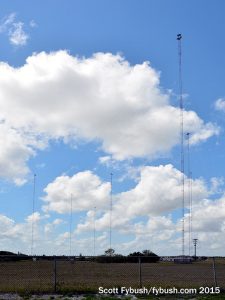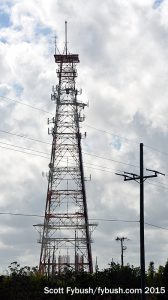NorthEast Radio Watch 12/15/2025: NYC Morning Shakeup
In this week’s issue… NYC morning shows exit - Carton back amidst WFAN shakeup - FM signing off in Canada - More radio centennials
Text and photos by SCOTT FYBUSH
In last week’s installment (and the one the week before), we got to see most of the FM-TV infrastructure in Miami and vicinity, all tucked neatly into a fairly tight tower farm right along the Broward/Miami-Dade county line. In this week’s installment, we check out most of the AMs (and one lonely FM), and it takes rather more driving to do it.

There’s not much AM to speak of in Broward County, where Fort Lauderdale and vicinity didn’t start developing in earnest until the AM band had mostly filled up. WGMA (1320 Hollywood) signed on in 1953 as a 1000-watt daytimer, but later on (as WLQY) it went to 5000 watts day and night from studio and four-tower array at 9881 Sheridan Street in Hollywood.
That site, shown above near sunset, is now dominated by a self-storage facility, but in the 1980s and 1990s it was home to studios for two bigger signals purchased by WLQY’s former owner, Sunshine Wireless: Miami-licensed WQAM (560) and WKIS (99.9 Boca Raton) cohabitated here before moving south and becoming Beasley stations.
From here, our actual chronological path back in March 2015 took us westward across Alligator Alley at night to Fort Myers, then on a big South Florida loop that didn’t return us to Miami for a week. But we’ll keep all our Miami pictures together here on Site of the Week – so we jump ahead to our last couple of days in the region and to northern Miami-Dade County. Off the Florida’s Turnpike Extension on NW 138th Street in Miami Gardens, we see the little four-tower array of WNMA (1210 Miami Springs) and its X-band sister, WJCC (1710 Miami Springs). Would you believe WNMA, the ESPN Deportes outlet for the market, puts out 47 kW by day from here? (It started out way back when with just 250 watts on 1220 as WMET and then WCMQ, one of several Spanish-language outlets that took on Cuban-sounding callsigns after the revolution.)
WINZ (940) is just a short distance to the east in Miramar, in a sketchy neighborhood around the corner from the Dolphins’ stadium. With 50 kW non-directional by day, this is one of Miami’s biggest AMs, though the drop to 10 kW from six towers after dark limits the signal into Broward County pretty drastically. At one time, Guy Gannett maintained studios for WINZ and sister station WZTA (94.9) out here, too.
Our final big AM in north Dade before heading southward is another big 50 kW boomer. George B. Storer named his station after himself – WGBS – when he bought the former WFTL (1400 Fort Lauderdale) after it received a big increase to 50,000 watts fulltime on 710. After spending some time at a site at Griffin and Pine Island Roads in Davie, Broward County, WGBS built this plant in what was then an undeveloped part of Miramar in the mid-1960s. Two decades later, the big 710 signal was sold to become Spanish-language WAQI, and that’s what it’s been ever since. Today Univision owns WAQI, and the original Storer building and six towers are flanked by Univision storage buildings and a garage for its TV trucks.
Inside, the original Storer-homebrew phasor still dominates one side of the long transmitter room, taking pride of place next to a Harris DX50 and the newer Nautel that’s now WAQI’s main.
The other side of the room features a row of small emergency studios that could be used by each of Univision Radio’s Miami-market stations in the event their main studios closer to town become unusable. (And yes, that’s most definitely a Cuban flag above the phasor; this night signal blows south over Cuba and much of the Caribbean.)

WAQI’s site off SW 172nd Avenue in Miramar now sits amidst some dense and fairly expensive newer housing, and Univision has made plans for relocating the station if its current site gets overtaken by that development (we’ll see those in a bit).
There’s much less danger of development encroaching on the next few stations we see: they line Krome Avenue (SR 997), the lonely ruler-straight road that defines the boundary between the developable part of Miami on the east side and the Everglades on the west.
WWFE (670) was one of the last new 50 kW stations to sign on, making its debut in Spanish in 1989 from a site on the east side of Krome; later on, WWFE became a sister station to an older Spanish-language signal, WRHC (1560 Coral Gables), which lost its old site in the ocean off Key Biscayne to Hurricane Andrew. WRHC moved to 1550, and now diplexes on several of WWFE’s towers under a long-term STA. (You’re as likely to hear a WWFE legal ID on 1550 as a WRHC ID, at least in the hours when we were listening.)
Also out here on Krome is a lonely microwave tower whose top platform houses WGNK (88.3 Pennsuco), a Spanish-language religious station that was tightly wedged into the noncommercial band as WIRP in the 1990s.
Krome Avenue’s desolation is broken up at Tamiami Trail (US 41) by a casino that anchors one corner of the intersection with what was once the only east-west road across the Everglades. Long before the casino was here, Spanish-language WQBA (1140, originally WMIE) was out here. It’s at this six-tower facility that Univision will relocate WAQI if the need arises, at the expense of a big reduction in night power that will make 710 unlistenable up into Broward County.
From here, we turn not eastward into Miami but westward into the Everglades, where two very remote AM sites await us. About five miles west of Krome, we snap some shots out the side of the car of the eight-tower array of Salem’s WHIM (1080 Coral Gables, known for many years as WVCG) and a much newer signal, business-talk WZAB (880 Sweetwater), which signed on from here just in 2010.
And then, 10 miles out from Krome past the alligator tours and souvenir stands, a nearly-unmarked turn leads out to the five towers of Lincoln Financial (now Entercom)’s sports station, WAXY (790 South Miami). Licensed at 5 kW day and night, WAXY has long been running 25 kW into this directional array under an STA aimed at overcoming Cuban interference.
Thanks to Univision’s Enrique Lopez for the tour!

As we announced a few weeks ago, the 2026 edition of the Tower Site Calendar will be the last.
We began publishing it 25 years ago, and the broadcast landscape is radically different now.
Radio World just ran an excellent article about us if you want to know more.
Once it’s gone, that’s it. We won’t be printing any more.
Thank you to everyone who saw our announcement and rushed to buy it. We appreciate you.
(There are some calendars from previous years if you want more of a tower photo fix — all under $5.)
But don’t wait to get this year’s Tower Site Calendar — buy it now!
We are selling the Broadcast Historian’s Calendar again this year, but we have that in an even smaller quantity — definitely don’t hesitate for that.
And visit the Fybush Media Store to check out our selection of books and videos, too!
And don’t miss a big batch of Miami IDs next Wednesday, over at our sister site, TopHour.com!
Next week: Our Miami visits wrap up (where else?) at the beach
In this week’s issue… NYC morning shows exit - Carton back amidst WFAN shakeup - FM signing off in Canada - More radio centennials
In this week’s issue… Veteran newsman returns - Remembering NY's Leitner, RI's Jones - CT AM saved - Maine AM moves - "Indie" adds suburban signals
In this week’s issue… Scripps stations face takeover - Sinclair moves more affiliations - CT stations sold - Maine AM surrendered - Remembering WVBR's Shapiro, WABC's Morgan
In this week’s issue… CT TV legend succumbs to cancer - Remembering PA's Adams - FCC still stalled by shutdown - Pittsburgh morning host exits